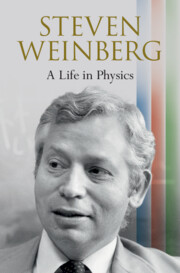Book contents
- Steven Weinberg: A Life in Physics
- Steven Weinberg: A Life in Physics
- Copyright page
- Contents
- Preface: The Twentieth Century
- Publisher’s Note
- 1 First Things
- 2 Turning to Science
- 3 Cornell
- 4 Copenhagen
- 5 Princeton
- 6 Manhattan
- 7 San Francisco and Berkeley
- 8 East to London
- 9 Berkeley
- 10 Cambridge: 1966–69
- 11 Cambridge: 1969–72
- 12 Cambridge: 1972–79
- 13 Gone to Texas
- 14 Super Collider Days
- 15 Austin: The 1980s
- 16 The Dark Energy
- 17 Austin: The 1990s
- Image Credits
- Bibliography
- Index
9 - Berkeley
Published online by Cambridge University Press: 22 November 2024
- Steven Weinberg: A Life in Physics
- Steven Weinberg: A Life in Physics
- Copyright page
- Contents
- Preface: The Twentieth Century
- Publisher’s Note
- 1 First Things
- 2 Turning to Science
- 3 Cornell
- 4 Copenhagen
- 5 Princeton
- 6 Manhattan
- 7 San Francisco and Berkeley
- 8 East to London
- 9 Berkeley
- 10 Cambridge: 1966–69
- 11 Cambridge: 1969–72
- 12 Cambridge: 1972–79
- 13 Gone to Texas
- 14 Super Collider Days
- 15 Austin: The 1980s
- 16 The Dark Energy
- 17 Austin: The 1990s
- Image Credits
- Bibliography
- Index
Summary
Back in Berkeley, Weinberg reconsiders how we understand some of the theories of physics, that is, why they actually are true. He begins teaching a general relativity course starting from physical principles, rather than the usual geometric approach. These course notes later became the basis for his book Gravitation and Cosmology. Around this time, Louise was pregnant, so Weinberg avoided opportunities to travel to spend more time at home. He begins working on functional analysis, but discovers the Russian Faddeev has already done foundational work in this area. Weinberg then reexamines what he knows about quantum field theory, and jettisons the Heisenberg–Pauli canonical formalism, taking particles as his starting point. This led him to a clearer understaning of antimatter. He embarks on a series of papers about massless particles. in 1964, he is promoted to full professor. Louise applied to Harvard Law School, prompting a move to Cambridge, Mass.
Keywords
- Type
- Chapter
- Information
- Steven Weinberg: A Life in Physics , pp. 72 - 92Publisher: Cambridge University PressPrint publication year: 2024

